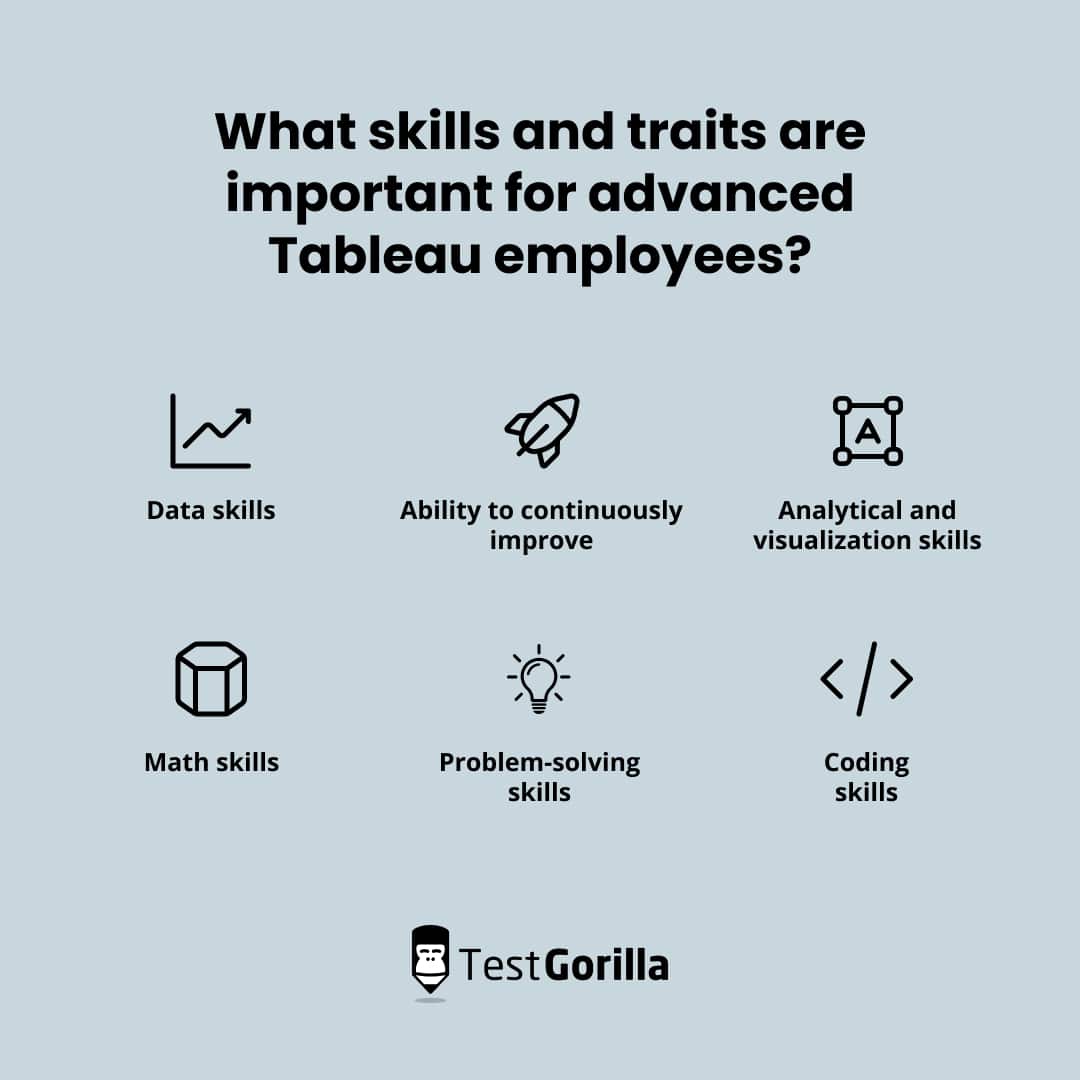Most organizations have a lot of data about their customers, sales, marketing, and other aspects of their business. Tableau is a popular business intelligence platform that turns this information into visual charts and interactive dashboards.
Hiring candidates skilled in Tableau Cloud, Tableau Server, Tableau Advanced Management, and the rest of the Tableau ecosystem ensures you have the talent to make the most of your business’s data.
And with TestGorilla’s 300+ scientifically validated tests, you have an objective way to evaluate candidates’ advanced Tableau skills and related proficiencies.
In this article, we explain why advanced Tableau skills are important and how you can use TestGorilla to assess them effectively.
What is an advanced Tableau skills assessment?
Advanced Tableau skills assessments are important when you need to hire business intelligence analysts, data engineers or scientists, analytics developers, or data analysts.
They measure applicants’ ability to handle large data sets, build visualizations of the data, and create dashboards within Tableau.
This assessment also evaluates individuals’ ability to perform advanced calculations, code within Tableau, and find links between data. It may also measure how well applicants can complete sophisticated calculations.
This assessment usually asks candidates to make Tableau-related decisions. For example, in a multiple-choice question, an applicant may be given a data sheet and asked to choose the way to present the data that includes all important information.
Or, a question may present a workplace challenge and ask the candidate how they would apply a data filter set. Questions might also include screenshots of Tableau’s interface and ask applicants what different features on the screen accomplish.
In addition, many advanced Tableau skills assessments evaluate related skills, such as critical thinking and communication.
Why are advanced Tableau skills important?
Professionals with advanced Tableau skills can help you:
Extract relevant data
Turning raw data into visualizations and reports – even with a platform like Tableau, that can handle large amounts of information – often involves disregarding irrelevant facts and metrics. Advanced Tableau users understand what information is relevant and should be included and what should be excluded.
Experienced Tableau users also know how to find and handle data effectively. They ensure that they input the right information into the appropriate Tableau resources to get the best, most accurate results from the start.
Make data accessible to all levels of an organization
Some individuals at your company may not have the time or skillset to analyze or handle data.
Professionals with advanced Tableau skills can manage large amounts of data and create interactive dashboards or visualizations that everyone at your company can understand and use.
Create dashboards and tools to create reports and more
Tableau Public and Tableau Desktop are products that help advanced Tableau users create dashboards, visualizations, charts, and reports. Tableau Online, Reader, and Server help developers, analysts, and other professionals share these resources with others.
Professionals with advanced Tableau skills can use these and others within the platform to create resources for your organization so you can make sense of your data.
Make business data actionable
Skilled Tableau users don’t just change how data appears. They also help you understand information, driving decision-making at your company.
For example, employees can use Tableau to create an interactive dashboard that lets users create forecasts and what-if analyses. You can see instantly, in real time, how different decisions could impact sales, revenues, and other forecasts.
The best insights on HR and recruitment, delivered to your inbox.
Biweekly updates. No spam. Unsubscribe any time.
What skills and traits are important for advanced Tableau employees?
Experienced Tableau professionals not only understand the platform inside and out, but they also have the following skills so they can use the platform most effectively:
Analytical and visualization skills
Analytical and visualization skills mean someone is familiar with data analysis, validation, and data design. They can run data analysis and find patterns and insights in information.
Tableau helps individuals manipulate aggregated data, run segmentation and cohort analysis, and more – but professionals who understand the principles of analysis can gather, arrange, verify, and source information to check work and ensure only accurate data enters the platform.
Data skills
Data skills include the ability to work with spreadsheets and databases to manage and present information. Strong data skills help individuals find, gather, arrange, process, and present data in the best way so it’s accurate, reliable, and ready to help an organization make decisions.
Problem-solving skills
Individuals with strong problem-solving skills are able to identify an issue, research and brainstorm possible solutions, and choose the option that will best resolve the problem. It’s essential that Tableau professionals possess these skills, as they’ll use them day to day.
For example, business leaders may ask a team to present current and past sales data but may also want forecasts. Advanced Tableau users can find the best way to present the data. They also have the know-how to add forecast data to an existing chart.
Problem-solving skills are also important to solve any challenges that arise. Employees well-versed in Tableau know how to troubleshoot if visualizations aren’t showing up as they should or if data isn’t clear in a chart. They can quickly identify the problem and find solutions.
Ability to continuously improve
Data changes fast, and so do company needs. Skilled Tableau users need to be able to develop their skills so they can make the best use of the platform’s features and fulfill the business’s needs.
Professionals must be able to continuously improve their skills in data gathering, data analysis, and Tableau features and functionalities. They have to stay up to date on any changes the platform launches so that when their organization has new data needs, they know exactly how to use Tableau to create the appropriate visuals, dashboards, and other resources.
Coding skills
It can be very beneficial for Tableau professionals to have some coding skills. These include familiarity with Structured Query Language (SQL), a coding language that allows individuals to create algorithms that manage data in Tableau.
Tableau also integrates with Python, R, and MATLAB, so understanding these languages means professionals can access advanced Tableau features and create accessible visualizations for complex modeling.
Math skills
Math skills relevant to advanced Tableau users include proficiency in statistics, the ability to work with data sets, and familiarity with complex calculations.
It’s important to test candidates for math skills because Tableau users may need to conduct initial data analysis to evaluate information and find key patterns.
With strong math skills, professionals who use Tableau can determine whether the platform can develop the solutions they need. They can also verify that the data they’re entering into the platform is accurate and relevant.
Skills and traits tests
TestGorilla offers a range of tests you can use to accurately measure Tableau skills and related proficiencies. Consider the following as part of your pre-employment assessments:
Tableau test
TestGorilla’s Tableau test evaluates applicants’ proficiency in using the platform to create visualizations, connect and manage data, build dashboards, perform and create advanced calculations, meet requirements in building visualizations, and more.
This test is a good fit for any candidate who needs to use Tableau as part of their job.
You can combine this test with TestGorilla’s coding challenges and coding language tests to create a comprehensive pre-employment assessment or use our Tableau interview questions for a deeper evaluation of your candidates’ skills.
Data Science test
TestGorilla’s Data Science test measures candidates’ proficiency in statistics, deep learning, machine learning, neural networks, and data science and programming. It evaluates intermediate-level data science skills.
This test is appropriate if you’re hiring data scientists, data analysts, and other professionals who use Tableau and other data science tools and skills.
Critical Thinking test
Advanced Tableau users can go beyond the platform and analyze the charts, reports, and visualizations the platform creates. A skilled professional should be able to view the analyses and graphs Tableau produces and determine if the end product makes sense and whether it’s the most useful way to present specific information. This requires strong critical thinking skills.
These skills are also important because professionals may be asked to build charts and visualizations based on specific requirements. For example, executives at an organization may want a dashboard that lets them test different scenarios.
Professionals well-versed in Tableau have the critical thinking skills necessary to understand the reason for the request and anticipate what-if scenarios leaders may be looking for. They can then problem-solve to create a custom solution within Tableau.
TestGorilla’s Critical Thinking test is perfect for evaluating these skills. It measures applicants’ inductive and deductive reasoning abilities, as well as their ability to interpret sequences, understand cause and effect, and more.
This test is ideal for any role involving critical thinking, including business data analysts and other professionals who use Tableau.
Communication test
Data analysts, programmers, and other professionals with advanced Tableau knowledge need to be able to work effectively as part of a team. This requires strong communication skills.
They must effectively communicate to others what Tableau can and can’t do. In addition, they must solicit regular feedback on their work to create better solutions.
Most importantly, Tableau professionals need to be able to explain their findings clearly, even to non-technical professionals at their organizations. This keeps everyone on the same page so they can make decisions together.
You can evaluate candidates’ communication skills using TestGorilla’s Communication test. It determines which candidates can clearly communicate verbally and through written text. The tests also assess professional etiquette, active listening, and non-verbal cues. This way, you can ensure your Tableau professionals can take direction, ask questions appropriately, and communicate with others politely and professionally.
Furthermore, this test measures applicants’ ability to interpret written and verbal communication, summarize messages, and clarify next steps.
Those who perform well on this test will understand what’s expected of them when they’re tasked with a project. The test also helps you verify that your talent can communicate complex data clearly.
Fundamentals of Statistics and Probability test
TestGorilla’s Fundamentals of Statistics and Probability test assesses applicants’ proficiency in statistical data analysis. It measures their ability to understand and work with random variables, sampling techniques, descriptive statistics, estimation methods, and inferential statistics.
Questions on this test may ask candidates to evaluate probability based on a real-life or theoretical example.
Applicants who do well on this test have the understanding of probability and statistics necessary to manage data in Tableau.
How TestGorilla can help you find the right advanced Tableau employee
Employees who use Tableau to create and update dashboards and other visual resources help translate mountains of information into clear, usable ideas.
However, it can be tricky to accurately evaluate a candidate’s proficiency with Tableau’s more advanced features. It can be even more challenging if you’re not familiar with Tableau yourself.
TestGorilla’s library of more than 300 scientifically validated tests gives you an objective way to evaluate Tableau proficiency – even if you haven’t used Tableau before. It also helps you measure candidates’ problem-solving skills, math and analytical abilities, communication skills, coding abilities, and more.
In minutes, you can create an assessment that measures multiple skills. Once applicants have completed their assessment, you get a candidate report that clearly explains their strengths. You’re able to rank test-takers by score, making it simple to identify top talent.
Whether you’re hiring a business intelligence analyst, developer, data scientist, or anyone else, our assessments help you pick the perfect person for the job. Get started with a free TestGorilla plan today.
You've scrolled this far
Why not try TestGorilla for free, and see what happens when you put skills first.















